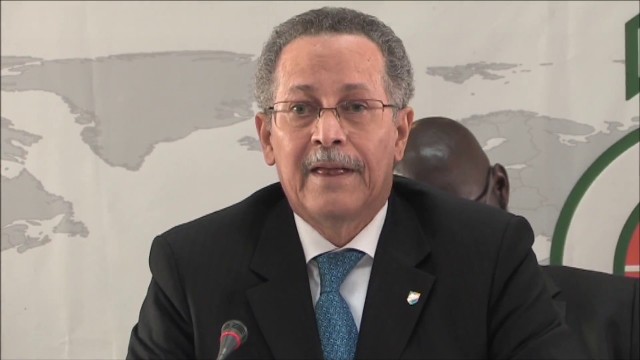 ACP Secretary-General Patrick Gomes: “We want to turn the challenge into an opportunity”. [picture source: ACP In-depth news]
ACP Secretary-General Patrick Gomes: “We want to turn the challenge into an opportunity”. [picture source: ACP In-depth news]
African, Caribbean and Pacific (ACP) nations are being urged to be pro-active in negotiating post-Brexit trade deals with the United Kingdom and with Europe.
ACP specialists, diplomats and academics met on 17 February to launch a report by the Ramphal Institute looking at Brexit and its implications for the ACP.
The Director of the Ramphal Institute and one of the report’s authors, Edwin Laurent, told the launch session that ACP countries faced a “formidable trade challenge”.
Mr Laurent pointed out that, while there had a lot of discussion on Brexit, it had been from a northern perspective and not from the perspective of the ACP.
A former Brussels-based diplomat himself, Edwin Laurent said that there never been a “terrible enthusiasm for the ACP” in Brussels.
The Director of the Africa Leadership Centre Professor Funmi Olonisakin urged the ACP to look at “how not to be left behind as a community of people”.
View the report launch and discussion
What will global Britain look like?
Participants discussed Britain’s approach to global partnerships in a post-Brexit world and the importance of the ACP seeking a multi-tiered trade arrangement to suit its short, medium and long term needs as the UK left the European Union.
The worst case scenario was depicted by speakers at the report launch as the EU simply rolling on and extending the time frame for existing trade and service deals.
The best case scenario was outlined as a mixture of an interim version of existing deals with moves to new and improved free trade agreements.
There were a lot of discussion on a so-called ‘EPA-plus’ – a better version of the existing Economic Partnership Agreement currently under negotiation between ACP countries and the EU.
Speaker after speaker at the Ramphal Institute pointed to the short time available from the UK’s triggering of Article 50 and the two-year period for UK-EU negotiations on the terms of Brexit.
Specialist Advisor to the House of Commons Select Committee on International Trade and one of the report’s authors, Dr Lorand Bartels, said that the grouping had to move to avoid a “potential interruption of trade between the ACP group and the EU” two years after the UK had pressed the Brexit trigger.
“Two years is not a long time”, he advised the Institute audience.
On the plus side, Dr Bartels and other speakers pointed to the ACP’s experience in forging trade deals.
ACP Secretary-General Patrick Gomes warned that any disruption for ACP nations in their EU and UK trade would affect millions of jobs. He outlined that meetings had already started with the UK’s International Trade Director. He said that the ACP had also started meetings with the Commonwealth Secretariat as Commonwealth ACP countries had “the most to lose from any [trade] disruption”.
Reaching out
Dr Gomes said that the ACP could not allow itself to be overtaken by the fall-out of Brexit and that ACP nation ambassadors in London and Brussels needed to work together with other private sector and Diaspora expertise.
He outlined plans for a joint UK-ACP working group to look at the need for the “refitting of the existing EPA’s to EPA-plus” while preserving the existing framework.
Dr Gomes said “we want to turn the challenge into an opportunity”.
Another of the report’s authors, Paul Goodison, a Senior Adviser with the Ramphal Institute, urged the ACP group to work together and achieve “much more credibility” as a large group in negotiating with the UK on post-Brexit deals and with the UK on its trade plans outside of the EU.
“A hard Brexit means that…you’ve got to be pro-active,” Dr Goodison told the audience.
He said that, while the Commonwealth would have to take a lead in the process, ACP nations would also have to collaborate and present their own arrangements to take to the negotiating table. He suggested strategies such as an early-day motion for parliamentary debate in the UK on the ACP’s continued trade relations with the UK.
“Reach out to your friends to make sure your voice is being heard”, Dr Goodison advised.
Copies of the Ramphal Institute report After Brexit – Securing ACP Economic Interests
are available from http://www.ramphalinstitute.org/www.ramphalinstitute.org and online.



